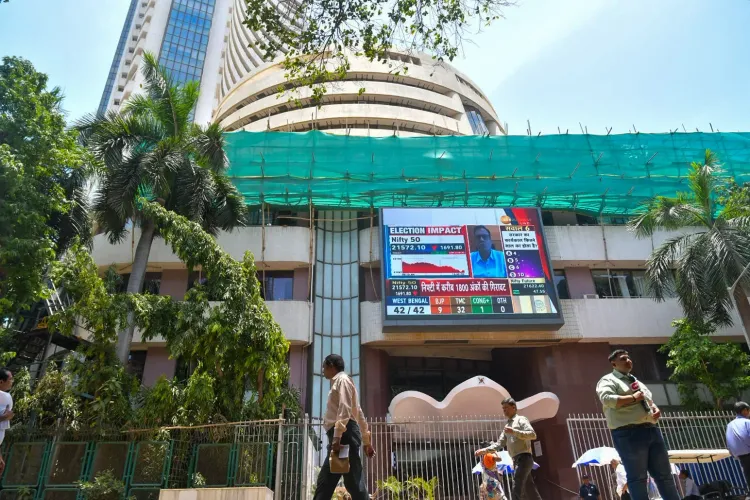Why Did the Indian Stock Market Decline Amid US Tariff Concerns?

Synopsis
Key Takeaways
- Indian stock market closes at a three-month low.
- Heavy sell-offs driven by US tariff concerns.
- Major sectors affected include real estate and metals.
- FIIs remained net sellers, increasing market pressure.
- Analysts suggest caution as market outlook weakens.
Mumbai, Aug 8 (NationPress) The Indian stock market experienced a downturn on Friday, driven by significant sell-offs across various sectors alongside a continuous outflow from foreign institutional investors (FIIs), primarily due to apprehensions surrounding US tariffs.
The Sensex concluded at 79,857.79, reflecting a decrease of 765.47 points or 0.95 percent. The 30-share index opened in the red at 80,478.01, compared to the previous session's closing of 80,623.26, amidst selling pressures linked to US tariff worries. The index hit an intraday low of 79,775, marking a decline of nearly one percent and reaching a three-month low amid widespread selling.
The Nifty wrapped up the day at 24,363.30, down 0.95 percent or 232 points.
"The Indian equity market witnessed a downward trend, closing at a three-month low amid rising concerns regarding the ramifications of U.S. tariffs on Indian exports. FIIs remained net sellers, amplifying the strain on domestic indices," remarked Vinod Nair, Head of Research at Geojit Investments Limited.
The bearish sentiment was widespread, with the real estate and metals sectors being the hardest hit. Furthermore, international financial entities have started to downgrade India's economic outlook, referencing the negative impacts of the ongoing tariff issues, Nair elaborated.
Among the notable losers within the Sensex framework were Bharati Airtel, Tata Motors, Mahindra and Mahindra, Kotak Bank, Reliance, Axis Bank, Asian Paints, Ultratech Cement, HDFC Bank, Tata Steel, BEL, and Infosys. In contrast, NTPC and Titan Trent managed to close in positive territory.
The selling pressure also permeated the broader market, with metal and pharmaceutical stocks suffering the most. The Nifty Next 50 dropped 823 points or 1.24 percent, Nifty 100 fell by 516 points or 1 percent, Nifty Midcap 100 slid 936 points or 1.64 percent, and Nifty Small Cap 100 concluded the session down by 264 points or 1.49 percent.
In terms of sectoral indices, Nifty Bank fell by 516 points or 0.93 percent, Nifty Fin Services decreased by 236 points or 0.9 percent, Nifty IT dipped by 328 points or 0.95 percent, and Nifty Auto closed 333 points or 1.40 percent lower.
"The bears have resumed their downward trajectory after a brief halt in the prior session. The Nifty has extended its losing streak to six consecutive weeks, dipping below its 100-day moving average (DMA) at 24,500, which is now anticipated to serve as an immediate resistance level," stated Nilesh Jain of Centrum Broking.
The 200-DMA, situated at 24,050, is likely to provide near-term support. The overall trend remains bearish as long as the index trades beneath 24,800, with any rebounds expected to face selling pressure, he warned.
The U.S. President Donald Trump recently announced a 50 percent tariff on imports from India and threatened to escalate it further if India continues to import oil from Russia.









